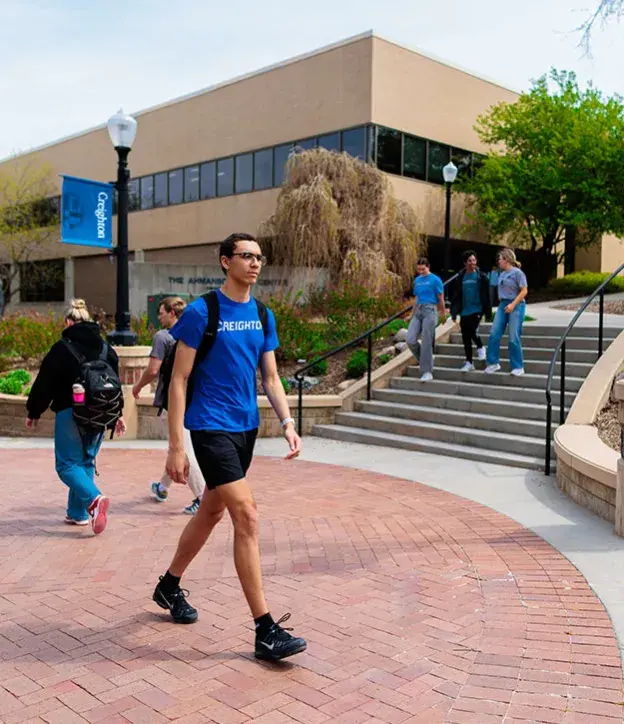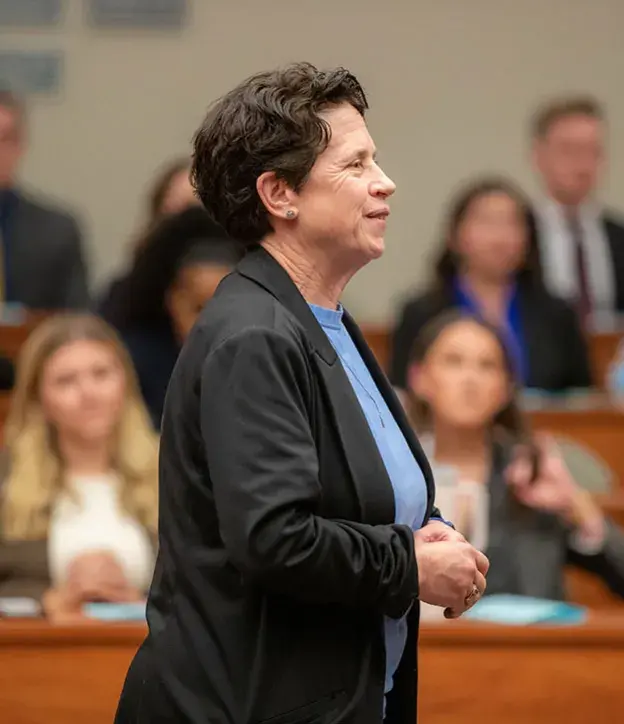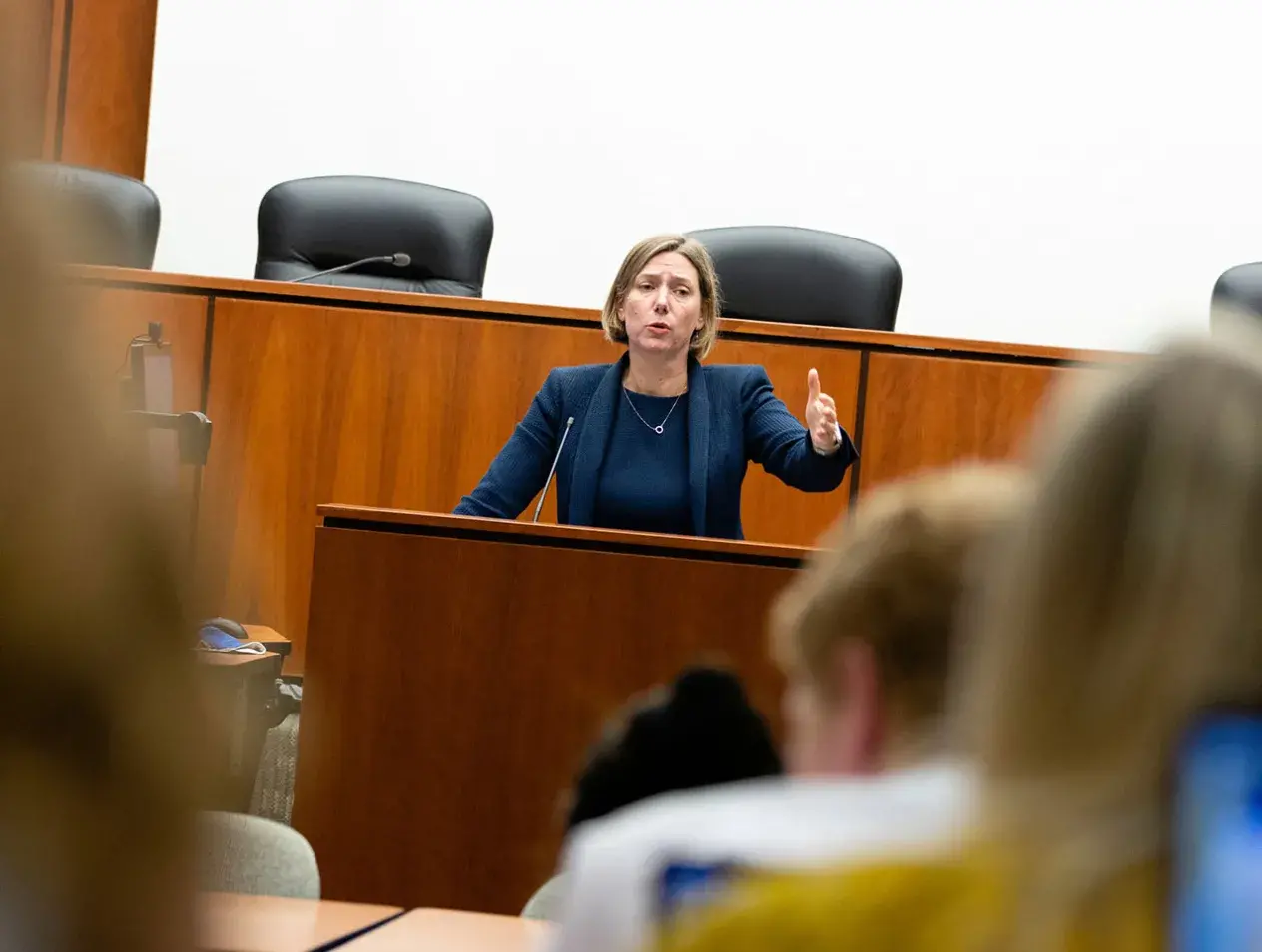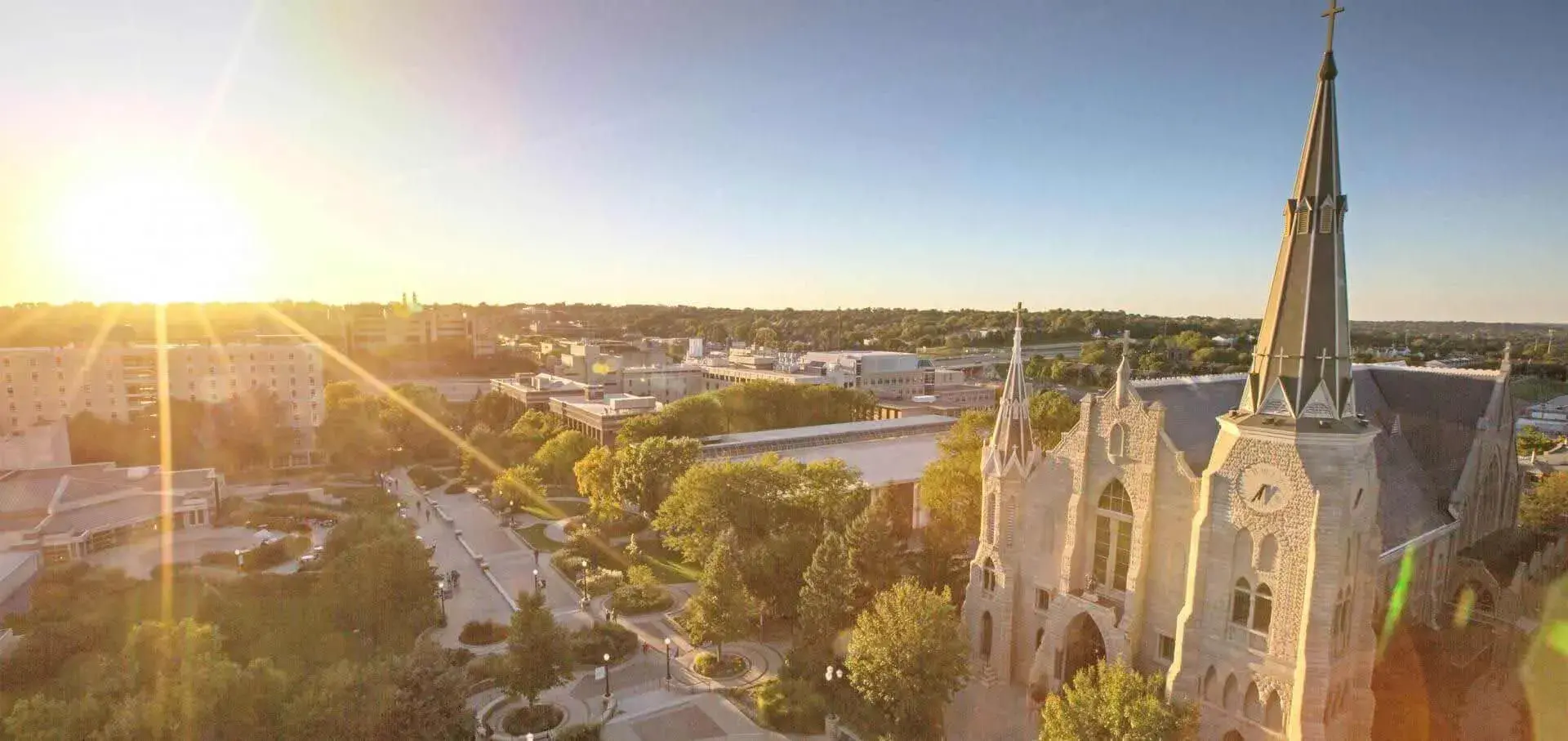
About the School of Law
There’s no place like Creighton University School of Law.
In 1904, the Creighton University School of Law was founded to both prepare lawyers and develop leaders. Today we continue to provide students with a powerful education, which is based on a solid mission statement and rooted in the Jesuit, Catholic tradition. In fact, we believe in the Jesuit idea of educating the whole person. This empowers our graduates to find their place in the world and contribute to the greater good—throughout their lives.
What we stand for, who we are and how we can help
Mission

At Creighton University School of Law, we believe that for the mind to flourish and intellectual curiosity to thrive, each student must develop as a whole. This philosophy aligns with the Jesuit approach to education as well as our school’s mission.
Leadership

Our team is here to lead you into the future. We invite you to read more about the School of Law leadership and administration, including our dean since 2019, Joshua Fershée, JD.
Faculty

Our faculty are here to encourage, challenge and mentor students. We invite you to learn more about them, as well as their open-door approach to engaging with students.
Contact Us

Whether you’re a prospective student who wants to visit and learn more, or you’re a current student who needs practical support, we’re here to help. On our admissions page, you’ll find important details about visiting the School of Law as well as key contact information.
School of Law By the Numbers
Numbers count when you’re thinking about law school. At Creighton University School of Law, our numbers are pretty impressive. But our favorite number? One (as in you). And 9:1 (as in our student/faculty ratio). And 1:1 (because our professors’ open-door policy drives home the individualized attention you can expect here). Here are other important numbers:
- Total enrollment: 387
- 67% of students are from out of state
- 48-52, male-female student ratio
- 27 full-time professors
- 37 adjunct faculty
- 7,000+ alumni
- 1,040+ hours of pro bono service performed by students (2022–2023)
Omaha by the Numbers
Greater Omaha regularly receives top rankings and recognitions, including:
- #9 Best State for Education, usnews.com, 2023
- #8 Best State to Find a Job, usnews.com, 2023
- #29 Best Places to Live, U.S. News & World Report, 2023
Creighton School of Law Location
The Creighton University School of Law is located in Omaha, Nebraska, adjacent to the city’s business district. Omaha is the largest city in Nebraska, on the Western bank of the Missouri River. It was originally called the “Gateway to the West,” and is now a communications hub for the nation. Omaha is also home to an outstanding legal community where you can complete life-changing and career-building externships and judicial clerkships.
Another reason Omaha is an ideal place to learn, work and live is because it’s below or above the national averages in several key areas.
- Below the national average: cost of living, home prices and commute times
- Above the national average: air and water quality, public and private education and cultural and entertainment amenities
Student Life and Housing
When you’re admitted to the Creighton University School of Law, you’ll become part of a community of professors and classmates who truly get to know you, your family and your goals. They’ll care about you and where you’re going. And when you’re taking a break, they may even join you in some fun activities around campus or town. Examples include:
Cheering on one of our 14 different Bluejays sports teams
Enjoying a meal within the Old Market, Blackstone District or Midtown Crossing
Grooving to something cool with Jazz on the Green
Catching a game at the NCAA Men’s College World Series
Visiting one of the nation’s best zoos or another iconic Omaha attraction
Participating in the weekly Thursday Taco Ride
Off-Campus Housing Options
Some areas that are close to Creighton University School of Law are Midtown Crossing which is located at about 30th St. and Dodge St., the Blackstone District, extending from 36th St. to 42nd St. along Farnam St., Dundee, at about 50th St. and Dodge streets, and Memorial Park, at about 60th St. and Dodge St. A number of apartment complexes are also located in downtown Omaha and around the Creighton neighborhood, with many within walking distance to campus.
Our university does not provide housing for graduate students.
Find a Roommate
Email the Creighton Law Office of Admissions for a list of current and incoming law students who are looking for roommates. During the late spring, Admissions will have a Facebook page for incoming students that is useful in connecting with others who are looking for roommates.
As a law school that is committed to providing an education that helps develop the whole person, personally and professionally, Creighton Law will not be participating in the U.S. News & World Report law school rankings process this year. The decision was not made lightly, and it comes after thoughtful discussion with a variety of our stakeholders. As a Catholic, Jesuit institution, we take seriously our obligation to educate the whole person and create a more equitable world. Jesuit education facilitates astute awareness, continual reflection and care for others, all of which are rooted in a meaningful process of discernment.
At Creighton Law, we have always focused our efforts on supporting our students and our community; cultivating the excellence of students, faculty, and staff; and working for the greater good. The reality is that we have not used ranking metrics to drive our decisions or our policies when that would not be beneficial to our students or our community. For the areas measured that provide such benefits, we’re already pursuing those with our best efforts, and we will continue to do so.
We do not question the good faith or good intentions behind the rankings, but the system remains flawed and can incentivize decision making that is contrary to our mission. Among other things, the current system does not account for (or value) regional differences, it does not consider the role of a law school’s mission in the educational process, and it values metrics that do not account for individual skills or holistic assessment of each potential student. We look forward to working with U.S. News and other interested parties to develop a more holistic ranking that provides students with a more nuanced and personalized view of their options, and we believe that is attainable.
For more than 115 years, we have been educating lawyers to serve and lead with skill, compassion and commitment. Our graduates include people from all walks of life from public servants to venture capitalists and M&A lawyers, and from JAG Officers and juvenile defenders to sports agents. We have multiple state and federal judges, as well as two current Chief Justices of state supreme courts. At every level, our graduates serve their communities and their profession. It is no secret that, at Creighton Law, we work hard, we work together, and we expect success. That will not change. For now, stepping away from the U.S. News law school rankings process is the right thing to do for our students, our community, and our distinctive values of academic excellence, careers of leadership and purposeful lives.
Sincerely,
Joshua P. Fershée, JD
Dean and Professor of Law
Creighton University School of Law
Creighton’s policy relating to the confidentiality of student records is in keeping with the “Family Educational Rights and Privacy Act” (FERPA). Information about students or former students will not be released without the consent of the student other than in the exceptions stated in the Federal Act. FERPA affords students certain rights with respect to their educational records. They are:
- The right to inspect and review the student’s education records within 45 days of the day the University receives a request for access. Students should submit to the Registrar, Dean, Department Chair, or other appropriate official, a written request that identifies the record(s) they wish to inspect. The University official will make arrangements for access and notify the student of the time and place where the records may be inspected. If the records are not maintained by the official to whom the request was submitted, that official shall advise the student of the correct official to whom the request shall be addressed.
- The right to request the amendment of the student’s education records that the student believes are inaccurate or misleading. Students may ask the University to amend a record that they believe is inaccurate or misleading. They should write the University official responsible for the record, clearly identifying the part of the record they want changed, and specify why it is inaccurate or misleading. If the University decides not to amend the record as requested by the student, the University will notify the student of the decision and advise the student of his or her right to a hearing regarding the request for amendment. Additional information regarding the hearing procedures will be provided to the student when notified of the right to a hearing.
- The right to consent to disclosures of personally identifiable information contained in the student’s education records, except to the extent that FERPA authorizes disclosures without consent.
- One exception that permits disclosure without consent is disclosure to school officials with legitimate educational interests. A school official is a person employed by the University in an administrative, supervisory, academic or research, or support staff position (including Public Safety personnel and Student Health staff); a person or company with whom the University has contracted (such as an attorney, auditor, collection agency, the National Student Loan Clearinghouse or the Voice FX Corporation); a person serving on the Board of Directors; or a student serving on an official committee, such as a disciplinary or grievance committee, or assisting another school official in performing his or her tasks.
- A school official has legitimate educational interest if the official needs to review an education record in order to fulfill his or her professional responsibility.
- Upon request, the University discloses educational records without consent to officials of another school in which the student seeks or intends to enroll.
- FERPA also allows the University to disclose directory information without the written consent of the student. Directory information is information contained in an education record of a student which generally would not be considered harmful or an invasion of privacy if disclosed. Directory information includes the student’s full name, the fact that the student is or has been enrolled, full-time/part-time status, local and permanent address(es), email address, telephone number(s), date and place of birth, dates of attendance, division (school or college), class, major field(s) of study and/or curriculum, degrees and awards received, participation in officially recognized activities and sports, weight and height of members of athletic teams, photograph, and previous educational agency or institution attended by the student.
- A currently enrolled student may request any or all directory information not be released by completing and filing with the Registrar’s Office a statement entitled “Student Request to Restrict Directory Information.” Such filing of this request shall be honored for the remainder of the term in which the request is filed, except that such restriction shall not apply to directory information already published or in the process of being published.
- The right to file a complaint with the U.S. Department of Education concerning alleged failures by Creighton University to comply with requirements of FERPA.
The name and address of the office that administers FERPA are:
Family Policy Compliance Office
U.S. Department of Education
600 Independence Avenue, SW
Washington, DC 20202-4605
It is the policy of Creighton University School of Law to provide equal employment and educational opportunities to faculty, employees, students and applicants for such opportunities without regard to race, color, religion, sex, national origin, age, handicap or disability, marital status, citizenship, sexual orientation, maternity and lactation status, status as a Vietnam-era, special, disabled, or other veteran who served on active duty during a war, campaign, or exhibition for which a campaign badge has been authorized in accordance with applicable federal law. In addition, it is the policy of the University to comply with applicable state statutes and local ordinances governing nondiscrimination in employment and educational activities. For more information, see Office of Title IX and Civil Rights Compliance.
For information on requesting academic or housing accommodations (including injury/temporary accommodations, please visit the Office of Student Accessibility Services.
As an ABA-accredited law school, the Creighton University School of Law is subject to the ABA Standards for Approval of Law Schools. The ABA Standards may be found on the ABA website. Any student at the law school who wishes to bring a formal complaint to the administration of the law school of a significant problem that directly implicates the school’s program of legal education and its compliance with the ABA Standards should do the following:
- Submit the complaint in writing to the dean of the law school or the associate dean for Academic Affairs. The writing may sent by email, hand delivered, or by U.S. mail, to the Dean’s Office.
- The writing should describe in detail the behavior, program, process, or other matter that is the subject of the complaint, and should explain how the matter implicates the law school’s program of legal education and its compliance with the ABA Standards.
- The writing must provide the name, official law school email address, and a street address of the complaining student, for further communication about the complaint.
- The dean or associate dean for Academic Affairs will acknowledge the complaint within three business days of receipt of the written complaint. Acknowledgment may be made by email, U.S. mail, or by personal delivery at the option of the dean or associate dean.
- Within two weeks after acknowledgment of the complaint, the associate dean for Academic Affairs shall either meet with or respond in writing to the complaining student. In this meeting or writing, the associate dean shall provide a substantive response to the complaint, information about steps taken by the law school to address the complaint or a statement that further investigation is needed. If further investigation is needed, then within two weeks after completion of that investigation, the associate dean shall provide the complaining student either a substantive response to the complaint or information about steps taken by the law school to address the complaint.
- The associate dean’s decision may be appealed to the dean, provided that the complaining student gives notice to the dean within 10 days after being advised of the associate dean’s decision on the complaint. The appeal must be in writing and addressed to the dean. The dean’s decision on the appeal shall be final.
- A copy of the complaint and appeal, if any, plus a summary of the process and resolution of the complaint shall be kept in the office of the dean for a period of eight years from the date of final resolution of the complaint.
For more information about Creighton University’s refund policy and how refunds are distributed, please visit the university’s withdrawals and refunds site.
Contact Us
Creighton University
School of Law
402.280.2872
lawadmissions@creighton.edu
Accreditation, Bylaws, Disclosures, Policies and Reports
School of Law Bylaws
We operate in accordance with the Creighton University School of Law’s faculty bylaws and American Bar Association (ABA) accreditation standards.
Accreditation Information
Creighton University School of Law is approved by the Council of the Section of Legal Education and Admissions to the Bar of the American Bar Association, 321 North Clark Street, Chicago, IL 60654, 312.988.6738.
According to the ABA, “Law schools that are ABA-approved provide a legal education that meets a minimum set of standards promulgated by the Council and Accreditation Committee of the Section of Legal Education and Admissions to the Bar. Every U.S. jurisdiction has determined that graduates of ABA-approved law schools are eligible to sit for the bar exam in their respective jurisdiction.”




